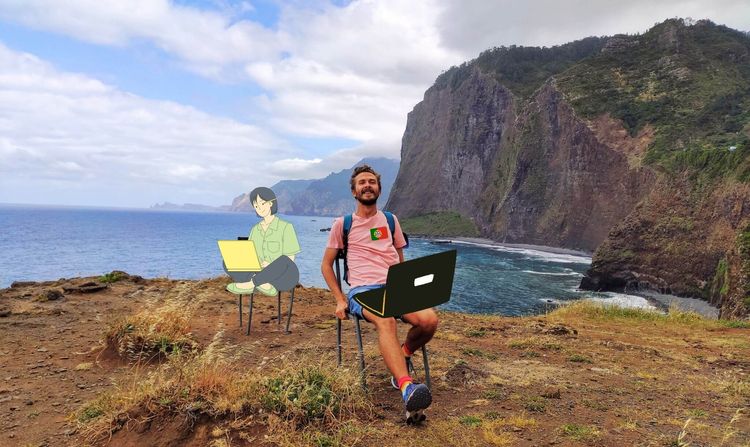With the rise of remote work, Portugal has become one of the most attractive destinations for digital nomads. The country offers a Digital Nomad Visa, allowing remote workers to live and work in Portugal while enjoying its vibrant culture, affordable living costs, and excellent infrastructure.
This guide provides the latest data, research-based insights, and step-by-step instructions on obtaining a Digital Nomad Visa for Portugal in 2024.
What Is the Portugal Digital Nomad Visa?
Portugal introduced the Digital Nomad Visa in October 2022, specifically designed for remote workers who are employed by foreign companies or are self-employed. The visa allows non-EU/EEA citizens to stay in Portugal while working remotely.
Types of Digital Nomad Visas in Portugal
There are two main types:
- Temporary Stay Visa (Short-Term):
- Valid for up to 1 year.
- Renewable.
- Allows multiple entries into Portugal.
- Residence Visa (Long-Term):
- Initially valid for 4 months.
- Requires applying for a residence permit upon arrival.
- Can be extended for up to 2 years, with renewal options.
Eligibility Criteria for the Digital Nomad Visa
To qualify, applicants must meet the following conditions:
- Minimum Income Requirement: Earn at least €3,280 per month (four times the Portuguese minimum wage, updated for 2024).
- Proof of Remote Work: Must be employed by a foreign company or work as a freelancer/self-employed professional for clients outside Portugal.
- Valid Passport: Must have a passport valid for at least six months beyond the stay period.
- Health Insurance: Proof of valid health insurance covering the stay in Portugal.
- Criminal Record Check: A clean criminal background certificate from the applicant’s country of residence.
- Accommodation Proof: Evidence of a rental agreement, hotel booking, or invitation letter from a host in Portugal.
Step-by-Step Process to Apply for the Portugal Digital Nomad Visa
Step 1: Gather Required Documents
Prepare the following documents before applying:
- Passport (valid for at least 6 months)
- Proof of employment or freelance work (e.g., work contracts, client invoices, or business registration)
- Bank statements from the past 6 months showing income above the required threshold
- Proof of accommodation in Portugal
- Health insurance policy covering Portugal
- Clean criminal record certificate
- Visa application form (download from the Portuguese consulate website)
- Passport-sized photos (as per Schengen visa requirements)
Step 2: Submit the Application
- Where to Apply: Applications must be submitted at the nearest Portuguese Consulate or Embassy in your home country.
- Processing Time: Typically takes 30-60 days, depending on your location and case complexity.
- Visa Fees: Approximately €90-120, subject to change.
Step 3: Attend the Visa Interview
Some applicants may be required to attend an interview at the consulate. Be prepared to explain your remote work, financial stability, and reasons for choosing Portugal.
Step 4: Receive the Visa & Travel to Portugal
Once approved, you will receive a visa sticker on your passport, allowing you to enter Portugal.
Step 5: Apply for a Residence Permit (For Long-Term Stay)
If you applied for the long-term visa, you must schedule an appointment with Serviço de Estrangeiros e Fronteiras (SEF) upon arrival in Portugal to obtain a residence permit.
Benefits of the Portugal Digital Nomad Visa
- Legal residency in Portugal with the ability to travel within the Schengen Zone.
- Access to high-quality healthcare and services.
- Lower cost of living compared to other Western European countries.
- Thriving digital nomad community in cities like Lisbon, Porto, and Madeira.
- Option to apply for Portuguese permanent residency or citizenship after five years.
Challenges & Considerations
- The high income requirement may be a barrier for some freelancers or early-stage remote workers.
- SEF appointment delays can sometimes extend the residence permit processing time.
- Tax obligations: Depending on the length of stay, applicants may need to explore Non-Habitual Resident (NHR) tax benefits or consult a tax professional.
Conclusion
Portugal’s Digital Nomad Visa provides an excellent opportunity for remote workers to experience the country’s rich culture while maintaining their professional activities. By meeting the eligibility criteria and following the application process carefully, digital nomads can enjoy a legal and hassle-free stay in Portugal.
For the latest updates, always check with the Portuguese Consulate or SEF website before applying.
